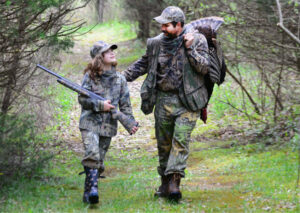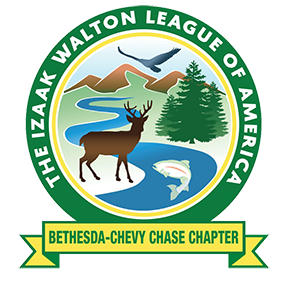FRANK PARKER: Hunting Principles
Frank Parker
240 405-7395 vats3@verizon.net
Often people go about their leisure interests with the purpose of satisfying desires and supporting beliefs built up over a lifetime. The focus is on a particular cause or project because in some way we see a benefit and/or enjoyment from participation in them.

There is a bigger picture than our own specific interests. We as members of the Izaak Walton League and particularly our Bethesda-Chevy Chase Chapter have recognized this and come to believe in a conservation ethic well described by the Izaak Walton pledge.
- To strive for the purity of water, the clarity of air, and wise stewardship of the land and its resources,
- To know the beauty and understanding of nature and the value of wildlife, woodlands, and open space,
- To the preservation of this heritage and to man’s sharing in it,
- I pledge myself as a member of the Izaak Walton League of America.”
Our attention to hunting on the Chapter’s farm is one manifestation of the pledge. The world around us, however, often doesn’t see the connection to this wide view of conservation, especially as it relates to hunting. The following excerpt from an article, The Future of Hunting in America (American Hunter magazine, March 2020.) by Frank Minter addresses this disconnect. Please read it over and see if you agree with the principles it describes.
“Hunters, hunting-related companies, and hunting-conservation groups are often too conservative. They’re afraid to offend. None of us want to attract negative attention. We’d understandably prefer to enjoy our pastimes without worrying about culture wars. We go to the woods to get away from all that. But we can’t hide in the woods and expect our sports to continue.

All of this has now led hunters to a new moment for hunting in America. We can either revitalize the hunter-conservation movement by proudly and loudly finding ways to make what hunter-conservationists do clear to the general public or we can allow hunting to be increasingly misunderstood and marginalized on social media and by the mainstream media.
A good way to push back is for us to articulate what we’re for to the 94 percent of the American public that doesn’t hunt. Here’s a start. Here are seven principles for us to boldly stand on. As you read them, realize that American Hunter wants to hear from you. What else can hunters do? Are there other principles you think should be included? Would you like to edit these? Let us know and we’ll publish your responses later as a part of this important and continuing conversation.
PRINCIPLE 1: People Are a Part of The Wild
As any honest wildlife biologist can tell you, we are not separate from the natural world. Wildlife doesn’t respect the invisible boundaries around our public lands. Unless we want to fence-off nature, we have to concede we share ecosystems with wildlife. This then requires us to balance our needs with wildlife. Hunting is an important part of keeping this balance across America-and with keeping our wild roots.
PRINCIPLE 2: Wildlife Belongs to All of Us
This is foundational to the North American Model of Wildlife Conservation. Since the 19th century, many U.S. courts have upheld and refined the premise that fish and wildlife belong to all. Still, any landowner who owns a lot of land can effectively control how wildlife is locally managed. This is why the NRA and many hunter conservation groups support Walk-In Access programs and other ways for allowing average Americans to help control and conserve our wildlife.
PRINCIPLE 3: Hunters Are Game Managers
Aldo Leopold, the father of modern wildlife management, began his eloquent crusade for a science-based system of conservation in the1920s and ’30s. Leopold, who was a hunter, helped refine a new ethos that led to trained biologists crafting pro-hunting policies based on scientific data. This process is influenced by hunters who attend public hearings held by state game agencies on changes to seasons and more. Some environmentalists are doing all they can to short-circuit this system. We have to stay aware and prevent them from using their emotion to trump reason.
PRINCIPLE 4: Hunting Has Deep Ethical Rules
In 1900, Sen. John F. Lacey helped push the Lacey Act through Congress. This act banned trafficking of wild game meat, ending the slaughter by market hunters, which gave wildlife a chance to recover. Not selling our hard-earned game meat is only one segment of an overall hunter ethic that starts with fair chase. We need to understand and teach this ethic.
PRINCIPLE 5: We Can All Get Along
Everyone has the opportunity to influence conservation.
Hunters and non-hunters alike have advocated for landmark environmental laws. Also, hunter-conservation groups often work together to lobby for important conservation programs as part of the Farm Bill and more. Hunters need to stand together.
PRINCIPLE 6: Collaboration is Fundamental
Waterfowl migrate across boundaries between states, provinces, and countries. Such is why it was critical that the Migratory Bird Treaty Act of 1918 made it illegal to kill ducks and geese except as allowed by regulated hunting. These and other protections have been critical to bringing back so many waterfowl species.
PRINCIPLE 7: Introduce Others to The Hunt

Talking about hunting to non-hunters can be difficult. But we can’t shy away from this anymore. They’ll likely be surprised to hear just how much hunter-conservationists do. They also might not know that taxes on firearms and ammunition, for example, fund conservation. Likewise, they might not be aware that hunting license sales also pay for so much game and non-game animal research and protections. When they find out how central hunting is to conservation they might just want to try it themselves, if only to get a little wild, free-range meat for their table. The NRA has a lot of resources to help hunters get started, to find training courses and so much more (explore.nra.org/interests/hunting).”
